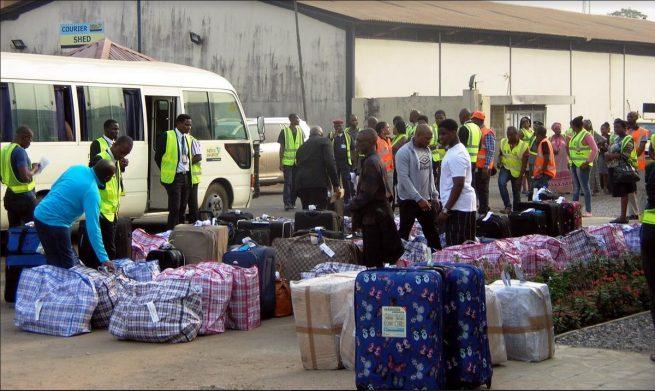News / Local
Zimbabwe braces for return of 'rogue' deportee nationals from UK
6 hrs ago | Views

The Zimbabwean government, under President Emmerson Mnangagwa, is reportedly preparing for the return of several nationals deported from the United Kingdom, with sources indicating that these individuals may be connected to opposition politics and efforts to undermine the ruling regime.
According to informed sources, the government has dispatched a special investigative team to the UK to probe the activities of those believed to have engaged in opposition movements and advocated for sanctions against Zimbabwe. The team's mission is to identify individuals accused of damaging the country's sovereignty and supporting efforts that, according to the government, harm its democratic institutions.
Sources within the Ministry of Home Affairs and Cultural Heritage revealed that these actions are part of a broader government initiative aimed at enforcing national laws and protecting Zimbabwe's political order.
"We are aware that some individuals deported from the UK have been politically active abroad, engaging in activities that are detrimental to Zimbabwe's sovereignty. This includes spearheading campaigns for sanctions and spreading misinformation to undermine our democratically elected government," one source said. "Such actions cannot go unchallenged."
The individuals reportedly under investigation include several deportees allegedly linked to opposition politics, such as Sibongile Kadzima, Jenatry Muranganwa (also known as Chihota), and Basil Kamombe, among others. These individuals are accused of engaging in activities designed to destabilize the government and incite external pressure against the country.
"Our team in the UK has identified these individuals through various strategies, and we can confirm they have cases to answer," the source added.
Government officials, who spoke on the condition of anonymity, emphasized that the investigation would follow due process, targeting only those who have violated Zimbabwean laws. They clarified that the focus is on individuals who are suspected of undermining the country's sovereignty, with deportation cases forming part of a broader operation.
"We will arrest them under the Criminal Law (Codification and Reform) Act [Chapter 9:23]," one source noted, explaining the potential legal consequences for those involved in actions deemed harmful to Zimbabwe.
The crackdown comes amid rising concerns from human rights organizations, which fear the investigation may be used as a pretext for political persecution. Activists have voiced concerns that some deportees, simply exercising their right to free speech in democratic countries like the UK, could face legal action upon their return to Zimbabwe.
The operation is reportedly gaining momentum due to the recent enactment of the Patriotic Act, which criminalizes actions seen as undermining national sovereignty or encouraging foreign interference in Zimbabwe's political affairs.
The move has sparked mixed reactions, with government supporters viewing it as a necessary step to safeguard Zimbabwe's national interests, while critics argue it is part of a broader strategy to silence political opposition and dissent.
As the investigation unfolds, it remains to be seen how the government will proceed with these cases and whether international human rights bodies will intervene to defend the deportees' right to free expression.
According to informed sources, the government has dispatched a special investigative team to the UK to probe the activities of those believed to have engaged in opposition movements and advocated for sanctions against Zimbabwe. The team's mission is to identify individuals accused of damaging the country's sovereignty and supporting efforts that, according to the government, harm its democratic institutions.
Sources within the Ministry of Home Affairs and Cultural Heritage revealed that these actions are part of a broader government initiative aimed at enforcing national laws and protecting Zimbabwe's political order.
"We are aware that some individuals deported from the UK have been politically active abroad, engaging in activities that are detrimental to Zimbabwe's sovereignty. This includes spearheading campaigns for sanctions and spreading misinformation to undermine our democratically elected government," one source said. "Such actions cannot go unchallenged."
The individuals reportedly under investigation include several deportees allegedly linked to opposition politics, such as Sibongile Kadzima, Jenatry Muranganwa (also known as Chihota), and Basil Kamombe, among others. These individuals are accused of engaging in activities designed to destabilize the government and incite external pressure against the country.
"Our team in the UK has identified these individuals through various strategies, and we can confirm they have cases to answer," the source added.
"We will arrest them under the Criminal Law (Codification and Reform) Act [Chapter 9:23]," one source noted, explaining the potential legal consequences for those involved in actions deemed harmful to Zimbabwe.
The crackdown comes amid rising concerns from human rights organizations, which fear the investigation may be used as a pretext for political persecution. Activists have voiced concerns that some deportees, simply exercising their right to free speech in democratic countries like the UK, could face legal action upon their return to Zimbabwe.
The operation is reportedly gaining momentum due to the recent enactment of the Patriotic Act, which criminalizes actions seen as undermining national sovereignty or encouraging foreign interference in Zimbabwe's political affairs.
The move has sparked mixed reactions, with government supporters viewing it as a necessary step to safeguard Zimbabwe's national interests, while critics argue it is part of a broader strategy to silence political opposition and dissent.
As the investigation unfolds, it remains to be seen how the government will proceed with these cases and whether international human rights bodies will intervene to defend the deportees' right to free expression.
Source - NewZimbabwe



































